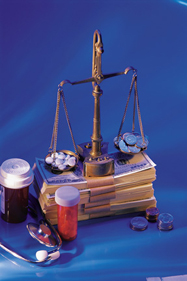Guidelines getting tougher on industry, but physicians are not
A survey of physicians found that respondents were comfortable with industry-sponsored lunches and other gifts, despite their institutions' prohibition against such practices. One physician discusses how to align medicine's ethical goals with physicians' attitudes.
Despite the old adage, a majority of physicians still believe that there is such a thing as a free lunch, at least according to a recent study.
Researchers from the Mount Sinai School of Medicine in New York City surveyed more than 500 physicians and students at hospitals affiliated with the school to assess their attitudes toward interacting with the pharmaceutical and device industries.

The survey found that, overall, the doctors and students had fairly positive attitudes about these relationships. Almost three-quarters of the respondents thought it was acceptable to eat lunch provided by a company, while about a quarter were OK with gifts over $50.
The results were published in the Archives of Surgery in June. Lead author Deborah R. Korenstein, ACP Member, spoke with ACP Internist about the survey's implications for future physician/industry interactions.
Q: Were you surprised by any of the survey's results?
A: We were a little bit surprised by the level of overall acceptance of these relationships in spite of change in the public perception and, in fact, the change in our local policy. The one specific result that surprised us was that trainees were more accepting of these relationships than older doctors. We had hypothesized the opposite; we thought that older doctors would be more habituated to all kinds of relationships with industry from even 10, 20 years ago, when these things weren't regulated at all and were far more widespread.
Q: What do you think explains trainees' greater approval of interactions with industry?
A: It's a little disturbing. I think, honestly, it just comes down to trainees [being] more burned out. They want whatever they can get. They're just not in a position to feel like they can turn down a free meal. That's my hypothesis. We really didn't ask them why.
The differences [between trainees' and older physicians' attitudes] weren't enormous. Many of [the trainees] still don't have positive feelings [toward industry]. Since the time that we performed this survey [in 2008], we and other medical schools are doing a lot more to try to teach medical students what's going on. Hopefully, that will persist as the overall environment changes. The environment has far more influence than our formal curriculum, probably.
Q: The survey also found that physicians who were more aware of their own institution's guidelines regarding industry were more disapproving of interactions. Is that an example of environment affecting attitudes, or does the causality work the opposite way, with physician concern leading to guideline development?
A: It was certainly not attitudes among physicians in general that have influenced guidelines. It's far more the public attitude that has influenced guidelines.
We can't really prove causality. I think it may be that people who are more aware of the guidelines are just more aware of this as an issue, and that's why they have more negative attitudes. My hope is that awareness of the guidelines is actually influencing their attitudes.
Q: Another interesting finding was that only about 36% of surveyed physicians thought their own prescribing was affected by gifts or food, but 52% said their colleagues are influenced. What do you make of that?
A: It doesn't surprise me. People in general are very poor at figuring out what influences them. So it's very likely people are underestimating the extent to which they're influenced; they're not overestimating the extent to which other people are influenced.
That [question] was first asked in a survey that was published in 2001. They found almost precisely the same thing that we found. It speaks to the fact that doctors are humans and fall under the rules of social psychology just like everybody else. But cognitive awareness of these issues does not seem to change that finding. The environment in 2000 when this was first posed to people was quite different.
Q: You also found that surgeons were more likely than other specialties to approve of industry interactions. A commentary that accompanied your study in Archives argued that surgeons have more need for these interactions, to learn about new devices. How do you feel about that?
A: I thought that commentary was quite fair. Their relationships really are more complex.

If you're an internist like myself, you have a lot of different ways to access information about drugs, and reps are not among the best ones. But for surgeons, the only way to get information about devices is from the device manufacturer.
But at the same time, the literature about these issues has been almost exclusively in non-surgical fields, in internal medicine and family practice mostly. The guidelines from those specialties were way ahead of the surgical guidelines. I think that the surgeons need to realize that there are influences and to honestly figure out a way to control the influence while still maintaining the collaborative relationships that actually are important to moving forward.
Q: How might they go about that?
A: They can demand more real evidence in evaluation of devices—not observational information, which is a lot of what they have to rely on right now. If the doctors were to demand better evidence, then the manufacturers would be forced to provide it, to actually do head-to-head comparisons of different devices and things that would inform evidence-based practice. The reason why we submitted [the study] to a surgical journal is because we wanted surgeons to be more aware of these issues so that they could move toward addressing the more complex issues that they face.
Q: Are there lessons from the study for general internists and hospitalists as well?
A: The differences across specialty were not nearly as great as the overall trend in attitudes. I think internists shouldn't be too smug about this issue. We still have a ways to go in terms of getting our attitudes congruent with attitudes of the public and the government. I really feel strongly that there have been other professional issues like this, where doctors have not led, where it's come back to harm us and harm medicine in the end. I'm hopeful that if doctors can catch up with the views that the government and the public hold, then we can become leaders in how to move forward with these relationships in a way that makes sense for patients.



